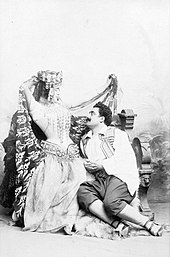Lucienne Bréval
Lucienne Bréval (actually Berthe Agnès Lisette Schilling ; born November 4, 1869 in Männedorf ; † August 15, 1935 in Neuilly-sur-Seine ) was a Swiss - French (received French citizenship on June 17, 1914 ), dramatic soprano and opera singer .
Live and act
Growing up in Männedorf, Bréval studied at the Lausanne and Geneva Conservatories , initially as a pianist, for which she even won first prize in Geneva in 1887. In Paris she also studied singing with Victor Warot and opera with Louis-Henri Obin at the Conservatory and made her debut in 1892 in the role of Selika in Giacomo Meyerbeer 's L'Africaine . Next to Félia Litvinnewho was born in St. Petersburg to German and Quebecan parents and was also not French, she dominated the singing subject in France from 1895 to 1914. While Litvinne had more of her international career in focus, Bréval remained essentially loyal to France's capital throughout her 30-year career. And also in contrast to Litvinne, there are hardly any recordings of her voice from Bréval with the exception of three so-called Mapleson cylinders , although she as an interpreter of the works of Gluck , but also of contemporary composers and v. a. Wagner was considered the French soprano of her time. On April 9, 1925, she was made a Knight of the Legion of Honor for her achievements as a lyric artist at the National Opera.
Individual evidence
- ↑ Breval Lucienne. Accessed April 30, 2020 .
- ↑ "Bréval, Lucienne", Music in the past and present , personal section: 3, p. 874.
- ↑ a b c Vincent Giroud: Lucienne Bréval (1869-1935) Great Swiss figure of the French song, in Revue musicale de Suisse Romande, No. 66/4 December 2013. Retrieved on May 2, 2020 .
- ↑ a b Lucienne Breval. Accessed April 30, 2020 .
- ↑ Ministère de la culture, Base Léonore. Retrieved May 2, 2020 .
| personal data | |
|---|---|
| SURNAME | Bréval, Lucienne |
| ALTERNATIVE NAMES | Schilling, Berthe Agnès Lisette (real name) |
| BRIEF DESCRIPTION | Swiss-French soprano and opera singer |
| DATE OF BIRTH | November 4, 1869 |
| PLACE OF BIRTH | Männedorf |
| DATE OF DEATH | August 15, 1935 |
| Place of death | Neuilly-sur-Seine |

